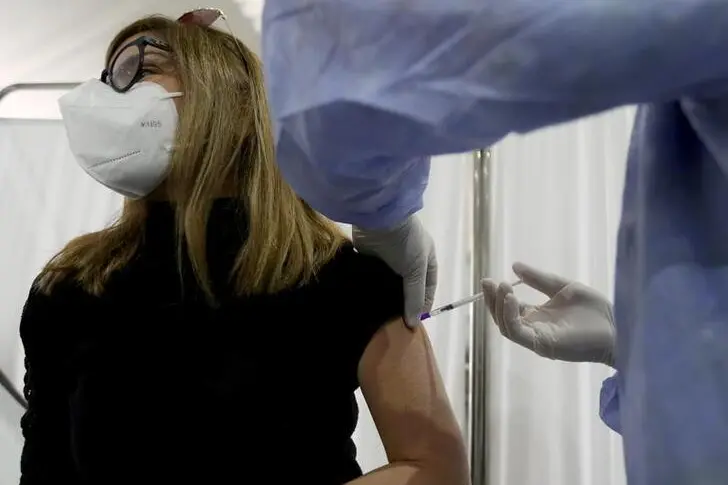PHOTO
BEIRUT: I am feeling excited clinical pharmacist Serena Chiha, 24, told The Daily Star as she left the newly established COVID-19 vaccination center at American University of Beirut Medical Center Sunday morning.
It is finally a new page, a new chapter for us because we have been through a lot, Chiha said.
Chiha, along with around 200 doctors, nurses, and staff at AUMBC will receive their first dose Sunday of the much-awaited Pfizer-BioNTech vaccine, as Lebanons national vaccination program officially kicked off with the arrival of 28,500 doses Saturday evening.
The hospital is one of the first in the country to begin administering the vaccine, alongside Rafic Hariri University Hospital and St. George Hospital. The Health Ministry has established a total of 42 vaccination centers in public and private hospitals across Lebanon.
AUBMC plans to vaccinate 400 people a day, the hospitals chief of staff, Dr. Samir Alam told The Daily Star after receiving the second vaccine administered that morning.
I say it is not a simple shot in the arm, its a giant step this is a great achievement in science, Alam said.
I am very happy, I am very grateful ... [but] it is a big reminder that we [still] have to remain very disciplined on health measures, he added.
Adjusting to the first day in what will likely be a yearlong vaccination process, medical staff spoke of their sense of relief, as Lebanon has been suffering from the worst outbreak of the infectious disease since the virus first arrived in the country nearly a year ago.
Walid Gharzaddin, a 68-year-old cardiologist at the hospital felt comforted having had his first dose and being one step closer to immunity.
It gives you more confidence next time you are talking to a patient, he told The Daily Star.
Hospitals have been overwhelmed by an acute surge in virus cases since the start of the year. In Beirut, corona ICU wards have been at full capacity, while across Lebanon wards reached 90 percent capacity. The number of fatalities from the virus now sits just below 4,000, with 1,603 people dying in January alone.
Moreover, hospitals have been under added pressure due to staff shortages from those ill with the virus and also due to an exodus abroad of trained medics as a result of Lebanons economic crisis that has crippled the value of the local currency and subsequently slashed salaries.
Last summer, AUBMC had to lay off hundreds of employees and cut wages citing the economic deterioration of the country and debt close to $150 million in medical bills owed from the government.
Chiha explained that in her department there are currently 17 staff members off sick with the coronavirus, and so my shifts have been longer because I have to cover for sick people.
The country has been under a strict lockdown over the last month, which has included a 24-hour curfew, in an attempt to contain the virus and bring respite to hospitals. Despite the measures, the infection rate has remained high at 22 percent and has led government officials to resist a reopening of the country, instead opting for a gradual eight week-long easing of restrictions, virus cases dependent.
A long queue of patients was formed outside the hospital building as specially trained nurses, part of the hospital's vaccine task force, began administering the injection to their colleagues. The whole process is designed to take just 30 minutes, Dr. Umayya Musharrafieh, infectious disease specialist and head of the hospitals vaccine program told The Daily Star.
Patients are first checked in by registration staff at a computer desk and then ushered through to the vaccination room, which consists of 10 vaccine stations where the jab is administered by a nurse. Just before, a nurse runs through the procedure and checks the patient for any allergies, along with their recent medical history.
After receiving the injection, patients then wait in a separate room for 15 minutes before leaving, as a precautionary measure to monitor for the possibility of any immediate side effects.
Yara, a first-year resident in the ear, nose and throat department told The Daily Star that it was worth the wait: [It is] pretty exciting, finally, we are one of the last countries to get the vaccine ... and it was good.
Those The Daily Star spoke to said it was a smooth process and didnt feel any pain receiving the injection.
The Pfizer-BioNTech vaccine has an efficacy level of 95 percent against COVID-19, with patients requiring two jabs delivered 21 days apart. Lebanon has ordered 2.1 million doses from the German pharmaceutical company, which will continue to arrive on a weekly basis, with 249,000 doses expected by the end of March.
Caretaker Health Minister Hamad Hasan has expressed hope that Lebanon can achieve herd immunity levels by the end of the year, which is reached when at least 80 percent of the population carries corona-fighting antibodies, achieved either through inoculation or natural immunity through virus infection.
Nurse Farah Hassar, 33, admitted to The Daily Star she was nervous about taking the jab, but happy too:
"We have to take the vaccine, to save our lives and our loved ones. It is our responsibility."
Copyright 2021, The Daily Star. All rights reserved. Provided by SyndiGate Media Inc. (Syndigate.info).





















